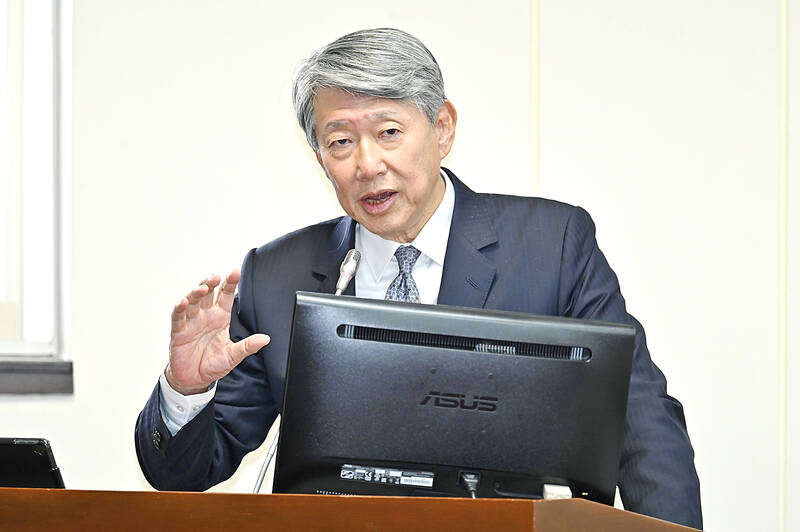Taiwan’s technology protection rules prohibits Taiwan Semiconductor Manufacturing Co (TSMC, 台積電) from producing 2-nanometer chips abroad, so the company must keep its most cutting-edge technology at home, Minister of Economic Affairs J.W. Kuo (郭智輝) said yesterday.
Kuo made the remarks in response to concerns that TSMC might be forced to produce advanced 2-nanometer chips at its fabs in Arizona ahead of schedule after former US president Donald Trump was re-elected as the next US president on Tuesday.
“Since Taiwan has related regulations to protect its own technologies, TSMC cannot produce 2-nanometer chips overseas currently,” Kuo said at a meeting of the legislature’s Economics Committee in Taipei.

Photo: Tu Chien-jung, Taipei Times
“Although TSMC plans to make 2-nanometer chips [abroad] in the future, its core technology will stay in Taiwan,” Kuo added.
LAW
Taiwanese law limits domestic chipmakers to producing chips abroad that are at least one generation less advanced than their fabs at home. TSMC told investors in July its next-generation A-16 chip is to enter volume production in the second half of 2026, after ramping up production of 2-nanometer chips next year.
According to TSMC’s overseas manufacturing roadmap, the company plans to produce 2-nanometer or more advanced chips in the US by the end of this decade, when its second fab in Arizona — which would utilize its 3-nanometer and 2-nanometer process technologies — becomes operational in 2028.
The third fab in Arizona would produce chips using 2-nanometer or even more advanced process technology, the chipmaker said.
TSMC’s first Arizona fab is set to ramp up production of 4-nanometer chips next month.
BILATERAL TIES
Meanwhile, Taiwan Semiconductor Industry Association (TSIA) chairman Cliff Hou (侯永清) yesterday said that history has shown that the result of the US presidential election would not significantly affect the company’s decades-long partnership between Taiwan and the US.
Hou also serves as a senior vice president at TSMC.
“The bilateral relationship has not changed because of the political landscape changes in the US,” Hou said at a forum in Hsinchu.
“There could be some alterations in details regarding this partnership. We will look at it when everything is certain,” Hou added.
Asked about how the TSIA could help local semiconductor companies navigate the challenges of the potential 10 percent tariff hikes that Trump threatened during his election campaign, Hou said the association has not received any official notification yet.
However, Taiwan should pour more resources into advancing chip technology and expanding its supply chain expertise to maintain global leadership, he said.
“We should accelerate research and development to ensure our standing as an indispensable member of the global semiconductor supply chain,” Hou said. “We are also working with the government to see whether we can attract foreign partners to set up design and materials centers in Taiwan.”
The 27-year TSMC veteran added that Taiwan must also aim to develop more expertise in equipment and materials, areas that are dominated by foreign businesses.
Additional reporting by Bloomberg

AI BOOST: Although Taiwan’s reliance on Chinese rare earth elements is limited, it could face indirect impacts from supply issues and price volatility, an economist said DBS Bank Ltd (星展銀行) has sharply raised its forecast for Taiwan’s economic growth this year to 5.6 percent, citing stronger-than-expected exports and investment linked to artificial intelligence (AI), as it said that the current momentum could peak soon. The acceleration of the global AI race has fueled a surge in Taiwan’s AI-related capital spending and exports of information and communications technology (ICT) products, which have been key drivers of growth this year. “We have revised our GDP forecast for Taiwan upward to 5.6 percent from 4 percent, an upgrade that mainly reflects stronger-than-expected AI-related exports and investment in the third

Mercuries Life Insurance Co (三商美邦人壽) shares surged to a seven-month high this week after local media reported that E.Sun Financial Holding Co (玉山金控) had outbid CTBC Financial Holding Co (中信金控) in the financially strained insurer’s ongoing sale process. Shares of the mid-sized life insurer climbed 5.8 percent this week to NT$6.72, extending a nearly 18 percent rally over the past month, as investors bet on the likelihood of an impending takeover. The final round of bidding closed on Thursday, marking a critical step in the 32-year-old insurer’s search for a buyer after years of struggling to meet capital adequacy requirements. Local media reports

TECHNOLOGICAL RIVALRY: The artificial intelligence chip competition among multiple players would likely intensify over the next two years, a Quanta official said Quanta Computer Inc (廣達), which makes servers and laptops on a contract basis, yesterday said its shipments of artificial intelligence (AI) servers powered by Nvidia Corp’s GB300 chips have increased steadily since last month, should surpass those of the GB200 models this quarter. The production of GB300 servers has gone much more smoothly than that of the GB200, with shipments projected to increase sharply next month, Quanta executive vice president Mike Yang (楊麒令) said on the sidelines of a technology forum in Taipei. While orders for GB200 servers gradually decrease, the production transition between the two server models has been

ASE Technology Holding Co (日月光投控), the world’s largest integrated circuit (IC) packaging and testing supplier, yesterday announced a strategic collaboration with Analog Devices Inc (ADI), coupled with the signing of a binding memorandum of understanding. Under the agreement, ASE intends to purchase 100 percent shares of Analog Devices Sdn Bhd and acquire its manufacturing facility in Penang, Malaysia, a press release showed. The ADI Penang facility is located in the prime industrial hub of Bayan Lepas, with an area of over 680,000 square feet, it said. In addition, the two sides intend to enter into a long-term supply agreement for ASE to